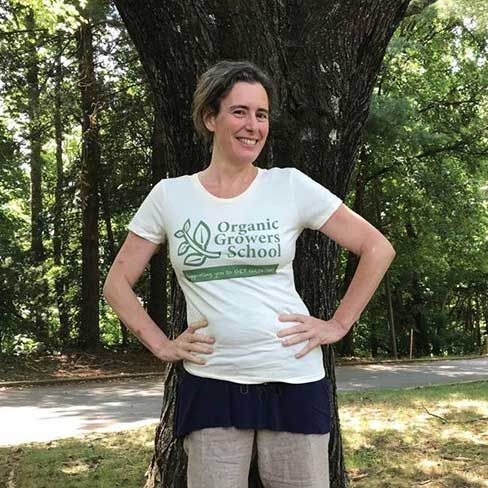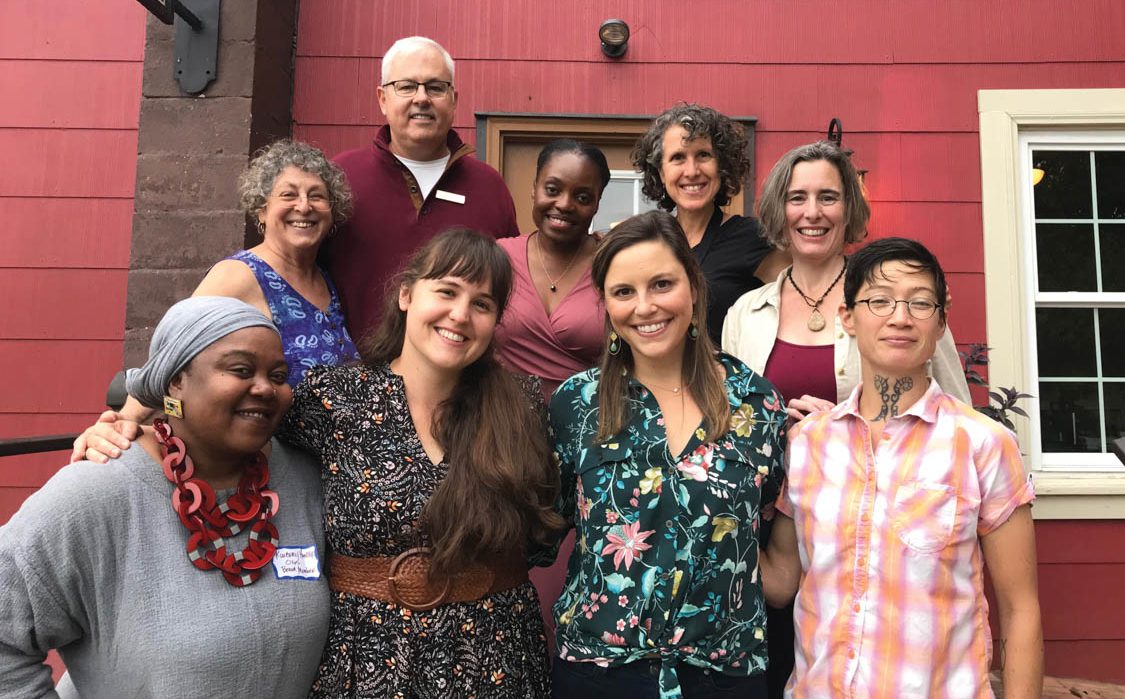By Robert Turner
Growing Food is Not Canceled. That’s the message from Organic Growers School (OGS) over the past few difficult months. You can still get out in the garden for some exercise and the psychological benefits that come from working with the soil to produce your own food.
Lee Warren has been the executive director of OGS for the past six years. OGS is the premier provider of practical and affordable organic education in the Southern Appalachians, dedicated to building a vibrant food and farming community.
Lee has become my mentor for passive resistance. She is calm, reserved and extremely intelligent. But she has a burning purpose that has brought her to head up a nonprofit that encourages people back to the land. A school dedicated to teaching people how to live closer to nature and sustenance.
Lee will be leaving her position with OGS this month. But wherever she goes, she will be bringing with her the character strength and virtue of a good and true leader. She is the embodiment, the personification, of local resilience. People should know what drives her.
I pulled out my notes from the last time we met. Late last fall, Lee came out to my farm and the Creekside Farm Education Center for an OGS fundraising breakfast. Plenty of staff and volunteers showed up to help set up for the event, so we took a short walk through the gardens to look at what was coming up.

Lee Warren
“What is so powerful about local food to you, personally?” I asked her as we strolled through neat, colorful rows of peppers, tomatoes and squash on a bright, sunny morning.
“It has been my experience that sharing a meal of locally grown food together with others is one of the greatest joys of life,” she said. “I find it so satisfying to be able to point to everything on our plates as being touched by people we love. It makes me happy.”
“What kind of world do you imagine at OGS?” I asked.
“We want more farmers on the land in a system in which small scale and sustainable farms can flourish. We want a garden, an orchard, and chickens in every yard. Is that too much to ask?” she said with a smile. “We want the average person to populate their daily lives with homegrown food. We want a democratic, equitable and just food system.”
I asked her why and she said this: “I believe that a direct relationship to the soil and to food will keep us alive and can cure all manner of ills. Growing food makes people healthier not only from the increased physical activity and eating fresher food but also the natural antidepressants in the soil and in nature that contribute to improved health. So many studies have shown that gardening can be as or more effective than pharmaceutical anti-depressants. Growing food and implementing sustainable practices also builds community, which reduces loneliness, violence and disconnection. It’s good for the soul. On a larger systems level, I believe that a local food system increases the money that stays in the community and in our farmers’ pockets, so it’s good for the local economy. Local food contributes to land preservation and scenic beauty. It prepares individuals and the collective for the vicissitudes of economic and political upheaval. It contributes to climate resilience because any scale of soil building takes carbon out of the atmosphere and helps cool the planet. And local food is more accessible for all, making the kind of equitable world we all want. Don’t you agree?”
“I agree,” I said. “What’s standing in your way?”
“The truly one big reason—the ubiquity of the corporate industrial model. It has resulted in many ills. Namely global poverty and hunger. The unsafe, high calorie and low-quality food that makes people sick. Did you know that four of the top ten killers in the US are preventable diet-related illnesses like heart disease, cancer, stroke and diabetes? It makes me sad. Another result of this industrial model is the unending damage to our ecosystems through resource depletion and pollution. And conventional agriculture is so fossil fuel dependent. For every calorie of food in these times it takes ten calories of oil to get it to mouth. From the fossil fuel-based fertilizers to the long-distance transportation, we are chained to oil. In fact, that dependence is so thorough that here in WNC we spend over $2.2 billion on food, but only $14.5 million was spent on all categories of local food. I’ll do the math for you. That’s less than 1 percent local food.”
Lee continued. “And maybe most important to me is that the model of corporate food has resulted in such a drastic loss of land-based literacy. You know that growing food was not a fringe activity a few decades ago. It’s how people sustained their lives and families. Especially in Appalachia. Joel Salatin, the food activist farmer and author, says that the first supermarket appeared on the American landscape in 1946, and that’s not very long ago. Until then, where was all the food? The food was in homes, gardens, local fields and forests. It was near kitchens, near tables, near bedsides. It was in the pantry, the cellar and the backyard. Over the course of these recent decades we’ve drastically eliminated farmers from our midst. The ones we have are aging out and will retire soon. And our own literacy about how to sustain our lives through food production and preservation is nearly gone.”
Lee is passionate about trying to do something about this problem. And for nearly 27 years, the organization she has overseen has been offering affordable, accessible, hands-on training, workshops, conferences and partnerships that inspire, educate and support people to farm, garden and live organically.
“In the world we imagine,” Lee continued, “growing food can transform the health crisis and the food insecurity crisis. It can strengthen communities, establish food sovereignty and prepare us for climate change.”
When I asked how the average person could get involved, she recommended growing our own food, supporting local farmers, volunteering at a community garden and advocating for regenerative agriculture among social, political, church and community groups.
Wisdom is Lee’s key character trait, which is important in a leader. Everywhere she could, Lee has pushed back the shadow of ignorance and fear that hover over the organic growing fields. Lee believes that knowledge and education are important aspects of a free society.
Wisdom and understanding take a prominent chapter and place in our discussion of the environment and sustainability because it takes rigorous, science-based research and understanding to fully know what is going on in our natural environment. It takes open-mindedness and good judgment to make the right decisions and plot the correct course of action. To Lee Warren and OGS, that means protecting the environment while we build food security, food sovereignty and community resilience.
“From my first OGS Spring Conference in 2002, to joining the staff in 2013, it has been life-changing and enriching beyond imagination,” Lee says.
Robert Turner is the director of the Creekside Farm Education Center. To learn more, visit EatYourView.com.


